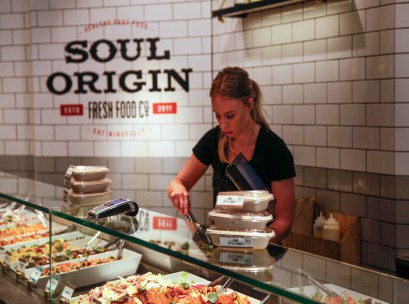 Last week, quick service restaurant Soul Origin opened its hundredth location in Australia, an impressive milestone considering the business is just seven years old.
Last week, quick service restaurant Soul Origin opened its hundredth location in Australia, an impressive milestone considering the business is just seven years old.
Soul Origin founder and CEO Chris Mavris believes the franchise could still double in size if it succeeds in modifying restaurants for high street strips in regional towns. Currently, the chain is primarily located in metropolitan shopping centres.
“If we can do towns like Orange, Wagga Wagga, Bendigo and country towns around Australia, I don’t see why we can’t get to 200-
plus,” he tells IRW.
Driving this rapid growth is Soul Origin’s fresh food offering. Its wholesome, made-on-the-day baked goods, sandwiches and salads
have proved appealing to a breakfast and lunch crowd.
“What we’re offering is something the Australian palette enjoys and wants to eat and drink,” Mavris says. “We use the word fresh, not healthy, because healthy means different things to different people. We talk about food for the soul, and at 3pm, a brownie may be good for your soul.”
Neither entirely health food, nor entirely comfort food, Soul Origin’s menu straddles a crucial middle ground. But the defining characteristic is the homemade quality of the food that seems decidedly un-chain-like.
Open bowls of pumpkin couscous, beetroot and feta salad and other gourmet salads, prosciutto paninis and chicken sandwiches line glass-fronted displays. Small signs showing menu items and prices pepper the display area, rather than appearing on signage above the cash registers, contributing to the feeling of a neighbourhood café.
It should come as no surprise that this homemade quality resonates with consumers. The observation has been made before that restaurants are influenced by trends in the broader retail industry, and one of the biggest trends at the moment is around authenticity.
Authenticity rules
In its 2018 report on global retail trends, KPMG said that authenticity has emerged as one of the attributes that matters most to customers. And Deloitte noted in a 2017 report that shoppers today “crave” authenticity, newness, convenience and creativity.
While authenticity can mean many different things in retail – referring to brands that are transparent about their supply chain’s environmental and ethical impact, or use “real models” in marketing campaigns, for instance – it often suggests an emphasis on quality over quantity, local over global and unique products over mass production.
This is certainly what Soul Origin has in mind with its focus on fresh, gourmet, made-on-the-day meals. The question now is how to maintain an authentic offering as the business expands.
“We understood those challenges from day one,” Mavris says about the dichotomy between authenticity and scale. This is the key reason that Soul Origin built its own production kitchen, which supplies all restaurants with cooked ingredients, Mavris says.
“We invested over $3 million in equipment and the manufacturing side of the business over the last 18 months to ensure that handmade aspect remains through everything we do,” he says. Mavris says that the central kitchen ensures consistency across
the company’s store network and will continue to do so as it grows. “Everyone talks about the consistency of McDonald’s and that
was in our minds from store one, how do we get consistency of product? It’s easy to overcook chicken or pasta. But if we control
that side of the business, we can get the McDonald’s consistency,” he says.
To be sure, nobody would confuse McDonald’s with homemade cuisine, but Mavris says the difference is that Soul Origin doesn’t
compromise on quality in order to compete on price. Rather, it’s investing in technology to enable the kitchen to supply more stores.
“We’re not making products to a price, where whoever has the cheapest price supplies the ingredients,” he says.
“There’s technology out there that will allow you to do bigger runs and get more shelf life out of product without having to add
preservatives. There’s post-pasteurisation and a whole lot of processes you can do to kill the micro-organisms that spoil food
without altering the flavour profile.”
No cookie-cutters
In contrast to Soul Origin’s growth strategy, Huxtaburger is taking a conservative approach to expansion to ensure its stores retain their authentic feel.
“We still believe that slow and steady wins the race, so to speak. We don’t want to grow for growth’s sake,” Huxtaburger CEO Matt
Fickling tells IRW.
Huxtaburger recently signed a multi-store franchise agreement with Sydney-based Yesdac Group to open 10 stores in NSW over
the next four years, which will more than double its existing store network. The company currently has plans to reach 50 stores,
but beyond that, Fickling says, the company would only end up damaging its position in the market.
“We’re not going to have 130 stores Australia-wide. The long-term key to the viability of our business is to give our customers what they want, and they just don’t want mass-produced stores,” he says.
Huxtaburger, which started in Collingwood in 2011, aims to tailor the look and feel of each restaurant to its location. The menu is
mostly limited to burgers, but because the three founders are all restaurateurs, nearly every aspect of the burgers are made in-house.
Fickling refers to this the “total product”.
“Our team members, uniforms, locations, store design and fitout… they are all examples of us not being a big mass-produced chain,”
he says.
“We don’t create cookie-cutter stores. There are common brand elements for sure, but we really want them to reflect the local
community. That feeds into the brand strategy.”
While Soul Origin’s Mavris believes that technology and consistency will enable the chain to expand without losing its
authentic feel, Fickling believes there is always a trade-off between the two.
“I fail to think of a brand that has opened hundreds of stores and been able to keep those individual and bespoke elements of a
brand. I can’ think of one,” he says. Time will tell whether Mavris can prove him wrong.





